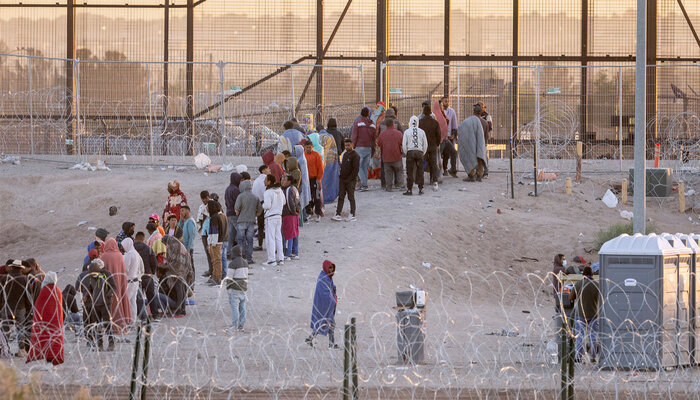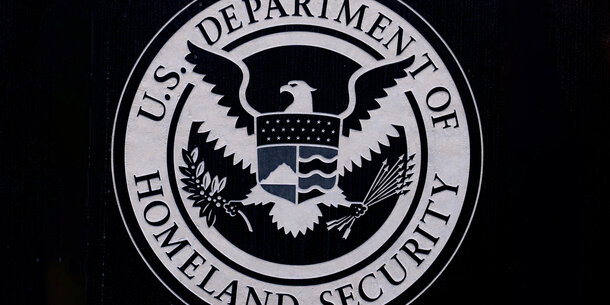This article first appeared at Just Security.
After three years, Title 42 — a pandemic-era policy under which tens of thousands of migrants and asylum-seekers have been summarily expelled from the United States — has ended. Both President Joe Biden and Texas Governor Greg Abbott have responded to this change by expanding the already large military missions that their respective governments maintain at the U.S.-Mexico border. In doing so, they are doubling down on a practice that has been growing steadily since the 1980s: military participation in immigration enforcement at the border.
They should be doing the opposite. The militarization of the southern border not only stigmatizes migrants and asylum seekers but also undermines core legal principles designed to protect democracy and individual liberty.
Biden and Abbott Escalate Border Deployments
Here’s what we know about the current deployments. Last week, the Biden administration announced that it is sending 1,500 active-duty soldiers to the U.S.-Mexico border for 90 days. These troops will reinforce 2,500 federalized National Guard personnel who are already at the border as part of a deployment that dates to early 2018. According to the Pentagon, these additional personnel will assist Customs and Border Protection (CBP) with “ground-based detection and monitoring, data entry, and warehouse support.”
For his part, Abbott on Monday announced the creation of a “Texas Tactical Border Force,” a unit of specially trained Texas National Guard personnel who will “intercept and repel” migrants attempting to cross the border at various “hot spots.” Abbott has already deployed these troops to El Paso and parts of the Rio Grande Valley, where they will join several thousand Texas National Guardsmen who are already at the border as part of Operation Lone Star, a military and state police mission that Abbott launched in early 2021.
While the United States’ armed forces have a long history of operating at the U.S.-Mexico border — indeed, the border was created through U.S. military force — for much of the nation’s history their activities were ad hoc rather than routine. The military was sent to the border in response to events such as the Mexican Revolution and left once things had returned to normal. This began to change in the 1980s, as President Ronald Reagan expanded the “War on Drugs” and inserted the armed forces into federal law enforcement’s counter-drug efforts at the border. Over the next 20 years, the military’s law enforcement activities spilled over, first informally and then officially, into the realm of immigration enforcement. The military also developed administrative and organizational frameworks — chief among them, Joint Task Force North— that entrenched their involvement in the United States’ approach to immigration enforcement and border security.
In the 21st century, as anti-immigrant sentiment has grown among large portions of the American public, presidents have begun to deploy thousands of troops to the border at a time. These mass deployments offer a more visible means of “securing the border” than the routine but comparatively small-scale military missions that characterized the military’s border operations in the 1980s and 90s. President George W. Bush began the pattern of mass deployments with Operation Jump Start in 2006, but they have persisted across the Obama, Trump, and Biden administrations. Indeed, the current federal military mission at the border was initiated by former President Donald Trump in 2018 under the name Operation Guardian Support. Yet it has been continued for more than two years by the Biden administration, which dropped the name “Guardian Support” but otherwise shows no signs of winding the mission down.
Border Militarization Undermines the Posse Comitatus Act, Stigmatizes Immigrants, and Harms the Military Itself
The use of federal military forces for law enforcement — including the enforcement of immigration laws — violates a tradition in American law and political thought that rejects military interference in civilian affairs. The Founders viewed such interference as a fundamental threat to democracy and individual liberty, and sought to guard against it through, among other provisions, the Third, Fourth, and Fifth Amendments to the Constitution. Today, this tradition is most clearly embodied by the Posse Comitatus Act, which prohibits military participation in civilian law enforcement activities except when doing so is expressly authorized by Congress.
Unfortunately, the Act is so riddled with gaps, loopholes, and ambiguities that it poses little practical barrier to the military’s involvement in routine civilian law enforcement at the southern border. For instance, when operating in so-called “Title 32” status — i.e., under state command and control, but pursuing a federal mission and paid by federal funds — the National Guard is not subject to the Posse Comitatus Act. Most of the federal border control missions performed by the National Guard have been in this status. In addition, the law provides no clear definition of what constitutes “law enforcement.” While certain activities, such as arrest and detention, clearly fall within that term, the government has construed many other activities, such as manning surveillance posts, to constitute mere “support” to law enforcement. Finally, even for activities that are clearly barred, the blunt hammer of criminal prosecution — the only remedy provided by the Act — provides little deterrent, given that no one has ever been convicted under the law (and there have been only two prosecutions).
By normalizing the use of soldiers to patrol the border over the past 40 years, the federal government has undermined the core legal principles that underlie the Posse Comitatus Act. It has also paved the way for Abbott’s Operation Lone Star. That might seem counterintuitive, as Operation Lone Star is, on its own terms, a challenge to federal authority. Texas has brazenly attempted to take the reins on immigration policy and border security, which are exclusively federal prerogatives under the Constitution. At the same time, however, the federal government’s routine deployment of thousands of troops to the border has given Abbott a degree of cover for both his militaristic approach and his bellicose rhetoric, which frames Texas’s actions in terms of “war” and “invasion.”
The militarization of the border also contributes to a broader stigmatization of immigrants and securitization of U.S. immigration policy. Using the military to patrol the border suggests to the American public that migrants are security threats at best, enemy combatants at worst, instead of human beings fleeing chaos and persecution in the hope of finding safety and a better life. As anti-immigrant sentiment grows, policymakers are pushed to enact more draconian immigration policies and further militarize the border. These decisions, in turn, generate still greater anti-immigrant sentiment and inflict lasting harmson migrants who are caught up in the U.S. immigration system.
The permanent presence of troops at the border is also bad for the military. A 2021 Army Times investigation into the federal border mission revealed an operation in disarray, due in large part to rampant drug and alcohol abuse by bored soldiers stationed in remote locations. At least 16 soldiers were arrested or confined that year alone, some for charges of sexual assault and one for manslaughter. Three members of a single 1,000-soldier unit based in McAllen, Texas, died during the year — all of them in separate, alcohol-related automobile accidents. Texas Guardsmen participating in Operation Lone Star have fared no better. They have been forced to endure poor living conditions and the state’s repeated failure to pay them on time. In just 13 months between September 2021 and October 2022, ten Texas Guardsmen stationed at the border died. Five died by suicide, with four of those deaths coming in just an eight-week span in late 2021.
* * *
Instead of doubling down on military participation in law enforcement, the Biden administration should end the current military missions at the U.S.-Mexico border and dismantle the institutional frameworks that perpetuate them. Congress should also take action to strengthen the Posse Comitatus Act. It should extend the law to cover National Guard deployments in Title 32 status, amend it to provide a clearer and more expansive definition of what constitutes “law enforcement,” and establish meaningful deterrents, such as civil remedies and an exclusionary rule for evidence obtained in violation of the law. Finally, as Operation Lone Star has shown, state constitutions and laws often lack any meaningful restrictions on a governor’s use of their state’s National Guard forces. States should consider passing laws ensuring that the use of Guard troops to enforce the law is reserved for exceptional situations.



